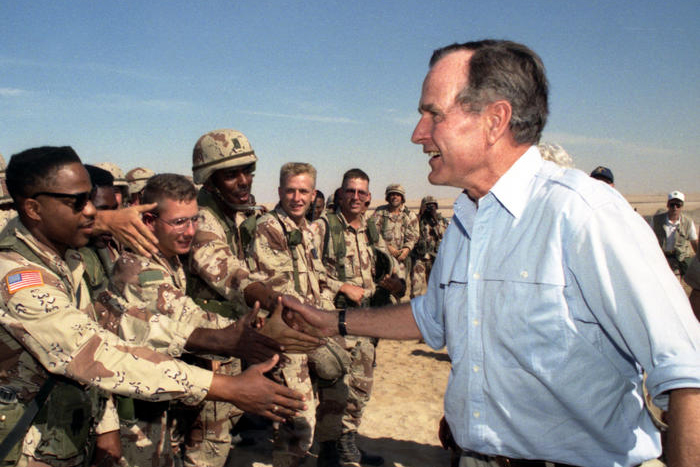The decision made by former President George Herbert Walker Bush to attack Iraq and start the first Gulf War remains one of the most controversial moves in American history. The decision was met with mixed reactions from both political parties and the public, and it ultimately led to long-standing consequences in the Middle East.
In 1990, Iraq invaded Kuwait and set off a chain of events that led to the United States becoming heavily involved in the conflict. At the time, George H.W. Bush was serving as the 41st President of the United States, and he faced mounting pressure from both his advisors and the international community to intervene in the crisis.
One of the main reasons why President Bush decided to go to war was due to concerns over oil reserves in the region. With the Middle East being home to some of the largest oil reserves in the world, there was a very real concern that an invasion of Kuwait by Iraq would disrupt the oil supply and cause severe economic repercussions around the world.
Furthermore, President Bush’s decision to go to war was influenced by a desire to showcase the strength of American military might on a global stage. He believed that by leading a coalition of countries against Iraq, the United States could assert its dominance as a global superpower and send a message to other nations that the United States would not tolerate acts of aggression against its allies.
Another political factor that influenced President Bush’s decision was the domestic political climate at the time. With the 1992 Presidential election looming on the horizon, many analysts believed that a successful military campaign in the Middle East could boost President Bush’s chances of reelection. However, this strategy ultimately backfired, as Bush lost to Bill Clinton in the 1992 election.
While some politicians and members of the public supported President Bush’s decision to go to war, others were vehemently opposed to the move. Many argued that the United States had no business intervening in a conflict that did not directly threaten its national security, and that the decision to go to war was motivated by economic greed and political ambitions.
Despite these concerns, President Bush ultimately decided to launch Operation Desert Storm in January of 1991. The war lasted just over a month and involved a massive coalition of countries, including the United States, the United Kingdom, France, Saudi Arabia, and others.
The military campaign was successful in driving Iraq out of Kuwait and restoring stability to the region. However, the victory came at a steep cost, both in terms of human life and financial resources. According to official estimates, the war resulted in the deaths of over 50,000 Iraqis and nearly 200 American soldiers, as well as a total cost of $61 billion.
After the war, the United States and its allies imposed sanctions on Iraq, which remained in place for over a decade. These sanctions had a devastating impact on the Iraqi people, leading to widespread poverty, disease, and food shortages.
Furthermore, the first Gulf War created long-term geopolitical consequences in the Middle East that are still being felt today. The war destabilized the region and contributed to the rise of extremist groups like Al Qaeda and ISIS, who capitalized on the power vacuum left by the weakened Iraqi government.
In conclusion, President George H.W. Bush’s decision to attack Iraq and start the first Gulf War remains a controversial topic to this day. While there were certainly valid reasons for intervening in the conflict, the decision was also influenced by political and economic factors that may have clouded the judgment of those involved. The long-term consequences of the war have been severe, and it is likely that the political fallout from this decision will continue to be felt for many years to come.
